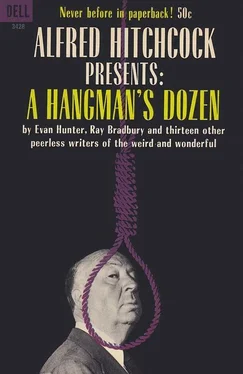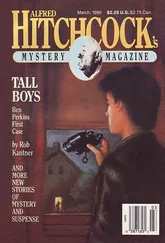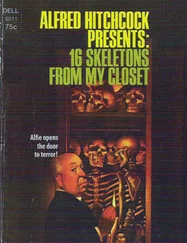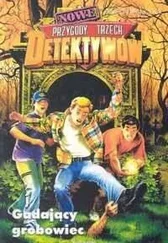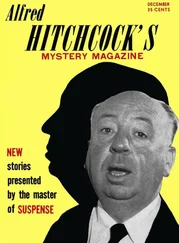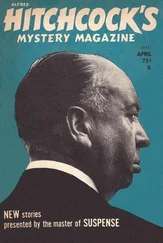“My name is Randolph Blair,” he said. He fancied he said it with great dignity. He fancied he said it the way Hamlet would have announced that he was Prince of Denmark. He could remember the good days when the name Randolph Blair was the magic key to a thousand cities. He could remember hotel clerks with fluttering hands, maître d’s hovering, young girls pulling at his clothing, even telephone operators suddenly growing respectful when they heard the name. Randolph Blair. In his mind, the name was spelled in lights. Randolph Blair. The lights suddenly flickered, and then dimmed. He felt the steel outline of the Luger against his belly. He smiled thinly.
“You know my name, don’t you, Mr. Atkins?”
“Yes,” Atkins said. “I know your name. I hear it sometimes.”
His interest was suddenly piqued. “Do you?” he asked.
“Yes. I hear people ask, every now and then, ‘Say, whatever happened to Randolph Blair?’ I know your name.”
He felt Atkins’ dart pierce his throat, felt the poison spread into his bloodstream. Whatever happened to Randolph Blair? A comedian had used the line on television not two weeks before, bringing down the house. Randolph Blair, the ever-popular Randolph Blair. A nothing now, a nobody, a joke for a television comic. A forgotten name, a forgotten face. But Atkins would remember. For eternity he would remember Randolph Blair’s name and the face and terrible power.
“Don’t...” he started, and then stopped abruptly.
“Don’t what?”
“Don’t... don’t push me too far, Mr. Atkins.”
“Push you, Nick?” Atkins asked innocently.
“Stop that ‘Nick’ business!”
“Excuse me, Mr. Blair,” Atkins said. “Excuse me. I forgot who I was talking to. I thought I was talking to an old drunk who’d managed to land himself a temporary job...”
“Stop it!”
“... for a few weeks. I forgot I was talking to Randolph Blair, the Randolph Blair, the biggest lush in...”
“I’m not a drunk!” he shouted.
“You’re a drunk, all right,” Atkins said. “Don’t tell me about drunks. My father was one. A falling-down drunk. A screaming, hysterical drunk. I grew up with it, Nick. I watched the old man fight his imaginary monsters, killing my mother inch by inch. So don’t tell me about drunks. Even if the newspapers hadn’t announced your drunkenness to the world. I’d have spotted you as being a lush.”
“Why’d you hire me?” he asked.
“There was a job to be filled, and I thought you could fill it.”
“You hired me so you could needle me.”
“Don’t be ridiculous,” Atkins said.
“You made a mistake. You’re needling the wrong person.”
“Am I?” Atkins asked blandly. “Are you one of these tough drunks? Aggressive? My father was a tough drunk in the beginning. He could lick any man in the house. The only thing he couldn’t lick was the bottle. When things began crawling out of the walls, he wasn’t so tough. He was a screaming, crying baby then, running to my mother’s arms. Are you a tough drunk, Nick? Are you?”
“I’m not a drunk!” he said. “I haven’t touched a drop since I got this job. You know that!”
“Why? Afraid it would hurt your performance?” Atkins laughed harshly. “That never seemed to bother you in the old days.”
“Things are different,” he said. “I want... I want to make a comeback. I... I took this job because... I wanted the feel again, the feel of working. You shouldn’t needle me. You don’t know what you’re doing.”
“Me? Needle you? Now, Nick, Nick, don’t be silly. I gave you the job, didn’t I? Out of all the other applicants, I chose you. So why should I needle you? That’s silly, Nick.”
“I’ve done a good job,” he said, hoping Atkins would say the right thing, the right word, wanting him to say the words that would crush the hatred. “You know I’ve done a good job.”
“Have you?” Atkins asked. “I think you’ve done a lousy job, Nick. As a matter of fact, I think you always did a lousy job. I think you were one of the worst actors who ever crossed a stage.”
And in that moment, Atkins signed his own death warrant.
All that day, as he listened to stupid requests and questions, as he sat in his chair and the countless faces pressed toward him, he thought of killing Atkins. He did his job automatically, presenting his smiling face to the public, but his mind was concerned only with the mechanics of killing Atkins.
It was something like learning a part.
Over and over again, he rehearsed each step in his mind. The store would close at five tonight. The employees would be anxious to get home to their families. This had been a trying, harrowing few weeks, and tonight it would be over, and the employees would rush into the streets and into the subways and home to waiting loved ones. A desperate wave of rushing self-pity flooded over him. Who are my loved ones? he asked silently. Who is waiting for me tonight?
Someone was talking to him. He looked down, nodding.
“Yes, yes,” he said mechanically. “And what else?”
The person kept talking. He half-listened, nodding all the while, smiling, smiling.
There had been many loved ones in the good days. Women, more women than he could count. Rich women, and young women, and jaded women, and fresh young girls. Where had he been ten years ago at this time? California? Yes, of course, the picture deal. How strange it had seemed to be in a land of sunshine at that time of the year. And he had blown the picture. He had not wanted to, he had not wanted to at all. But he’d been hopelessly drunk for... how many days? And you can’t shoot a picture when the star doesn’t come to the set.
The star.
Randolph Blair.
Tonight, he would be a star again. Tonight, he would accomplish the murder of Atkins with style and grace. When they closed the doors of the store, when the shoppers left, when the endless questions, the endless requests stopped, he would go to Atkins’ office. He would not even change his clothes. He would go straight to Atkins’ office and he would collect his pay envelope and he would shoot him. He would run into the streets then. In the streets, he would be safe. In the streets, Randolph Blair — the man whose face was once known to millions — would be anonymously safe. The concept was ironical. It appealed to a vestige of humor somewhere deep within him. Randolph Blair would tonight play the most important role of his career, and he would play it anonymously.
Smiling, chuckling, he listened to the requests.
The crowd began thinning out at about four-thirty. He was exhausted by that time. The only thing that kept him going was the knowledge that he would soon kill Mr. Atkins.
At four forty-five, he answered his last request. Sitting alone then, a corpulent unsmiling man, he watched the clock on the wall. Four fifty. Four fifty-two. Four fifty-seven. Four fifty-nine.
He got off the chair and waddled to the elevator banks. The other employees were tallying the cash register receipts, anxious to get out of the store. He buzzed for the elevator and waited.
The door slid open. The elevator operator smiled automatically.
“All over, huh?” he asked.
“Yes, it’s all over,” Blair said.
“Going to pick up your envelope? Cashier’s office?”
“Mr. Atkins pays me personally,” he said.
“Yeah? How come?”
“He wanted it that way,” he answered.
“Maybe he’s hoping you’ll be good to him, huh?” the operator said, and he burst out laughing.
He did not laugh with the operator. He knew very well why Atkins paid him personally. He did it so that he would have the pleasure each week of handing Randolph Blair — a man who had once earned $5,000 in a single week — a pay envelope containing forty-nine dollars and thirty-two cents.
Читать дальше
